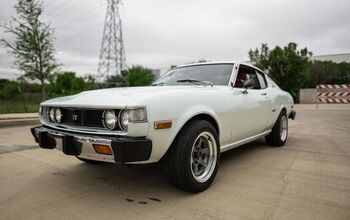US Tire Makers Oppose New Restrictions On Chinese Tires - It's A Union Thing

The United States International Trade Commission issued a split 3-3 ruling on a petition regarding Chinese tires filed by the United Steel Workers under U.S. Antidumping and Countervailing Duty (AD/CVD) laws. That means that — in all likelihood — the United States will put tariffs or other controls on tires imported from China. Counterintuitively, not one of the nine domestic American tire companies that produce 100 percent of the tires made here supports the AD/CVD petition.
Don Ikenson at Forbes explains the domestic tire producers’ lack of support for the ruling is due to the steel workers union not really being interested in stopping Chinese imports, but rather gaining power to use against their negotiating partners here in the United States.
The United Steel Workers represents about 40 percent of American tire workers. They were the sole petitioner that argued the domestic manufacturers are the victims of unfair trade. The problem with that argument: over the period of investigation, not only were all nine domestic producers profitable, but also that their profit margins increased at a better rate than either those of the automotive industry or the entire manufacturing sector.
The domestic tire industry is healthy. Capacity utilization in the industry during the investigation was right around 90 percent. To meet anticipated demands, three new entrants in the U.S. tire market will be spending $1.75 billion on new tire factories in the United States. Goodyear has announced $500 million in plant expansions — and that’s on top of $2.4 billion the domestic producers have recently invested in capital improvements.
That hardly sounds like an industry that’s suffering from unfair trade.
Part of the health of the domestic tire producers is because they don’t directly compete with Chinese tires. Domestic producers decided a while ago to focus on premium OEM and replacement tires, leaving the budget and economy side of the business to Chinese producers willing to exchange margins for volume. At the same time, eight of the nine domestic producers make their low-cost tires overseas. The controls on imports wouldn’t help the domestics sell the tires they make in the United States and also make it more expensive to import cheaper tires from China.

Ronnie Schreiber edits Cars In Depth, the original 3D car site.
More by Ronnie Schreiber
Latest Car Reviews
Read moreLatest Product Reviews
Read moreRecent Comments
- Jkross22 Hopefully they'll use Lucas Electronics. No half measures.
- Add Lightness I don't see a great deal of difference between old school slavery and being indentured to a 40 year mortgage requiring 2 people working 2 jobs each just to keep up with payments and not being able to afford health insurance.
- Aja8888 I was at a Buck-ees in Ironton, AL and all the EV chargers were full with waiting lines, The 200 or so gas pumps were pretty full too.
- Jkross22 "Somehow, the Finance Committee’s oversight staff uncovered what multibillion-dollar companies apparently could not." Wyden isn't wrong. If inept government can figure out who did what, it's not believable that BMW, JLR and VW didn't know or suspect. Probably a case of not asking a question if you don't want the answer. How high minded of them. The problem is that government isn't willing to punish automakers the way they punished VW for the CleanDiesel fiasco.
- Cprescott So bland that it was likely styled by ACME Motors - the same clowns who did the invisible Honduh Accord.

































Comments
Join the conversation
As with Korea, the Chinese tire industry will catch up eventually. Not long ago I bet people wouldn't have touched a "Made in Korea" tire....now they supply OEM tires for many manufacturers. (Hankook is to open a plant in Tennessee in 2016)
I just bought some Kumho's for my 16 year old beater. I figured at a minimum they were made in Korea. I had Pirellis made in Brazil that lasted 76,000 miles, but Pirelli is now owned by the Chicoms. Turns out the Kumhos were made in China. Outside of the economics, I'm not a big fan of Godless socialist, crony economies. I bought some Kelly's last year for another car that were made in the United States - should have done that again. Then again, it is clear the United States government is a Godless, socialist entity as well, along with the vast majority of large multinational U.S. corporations. Management of both are loyal to only what benefits them - power, control, and their stock options.